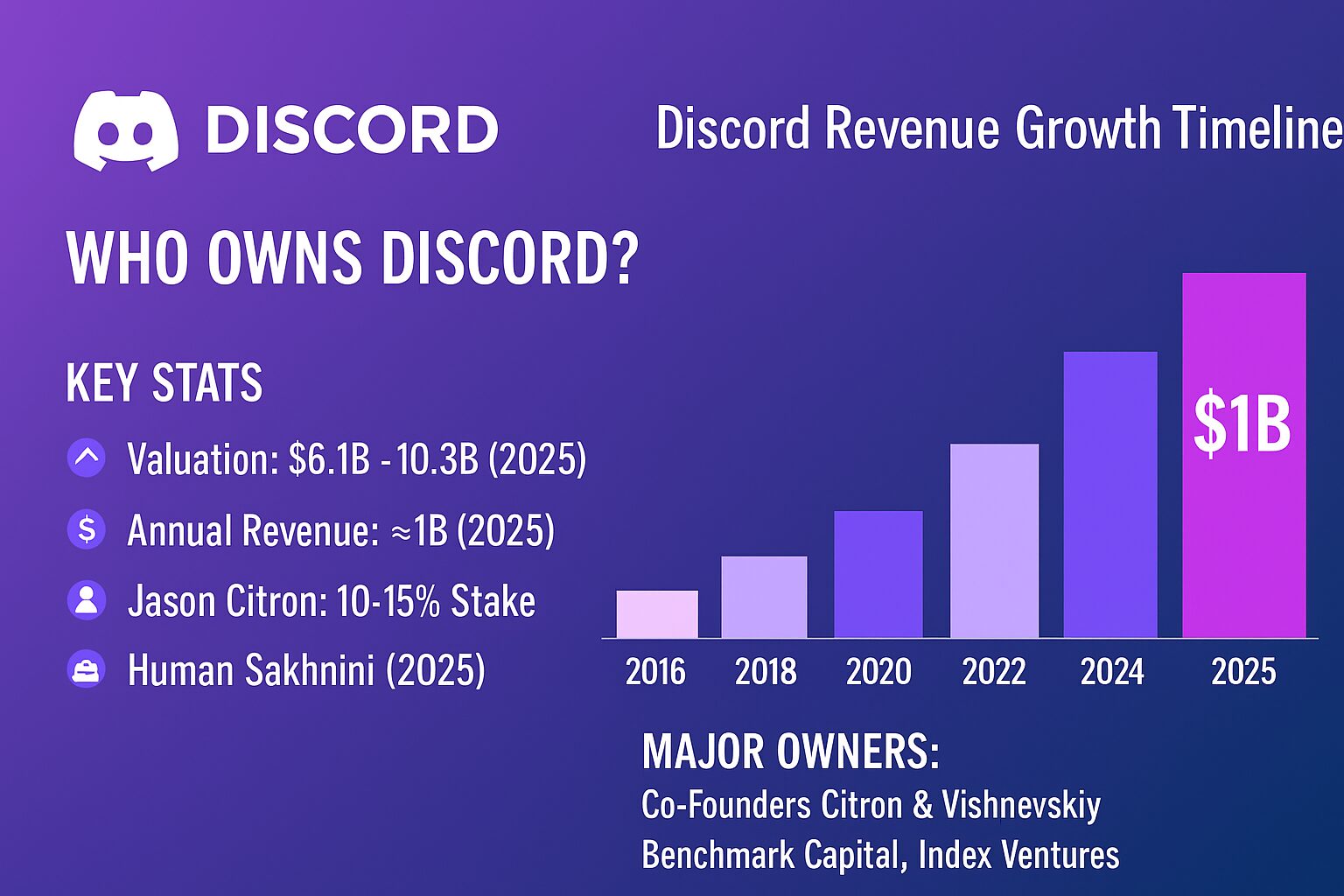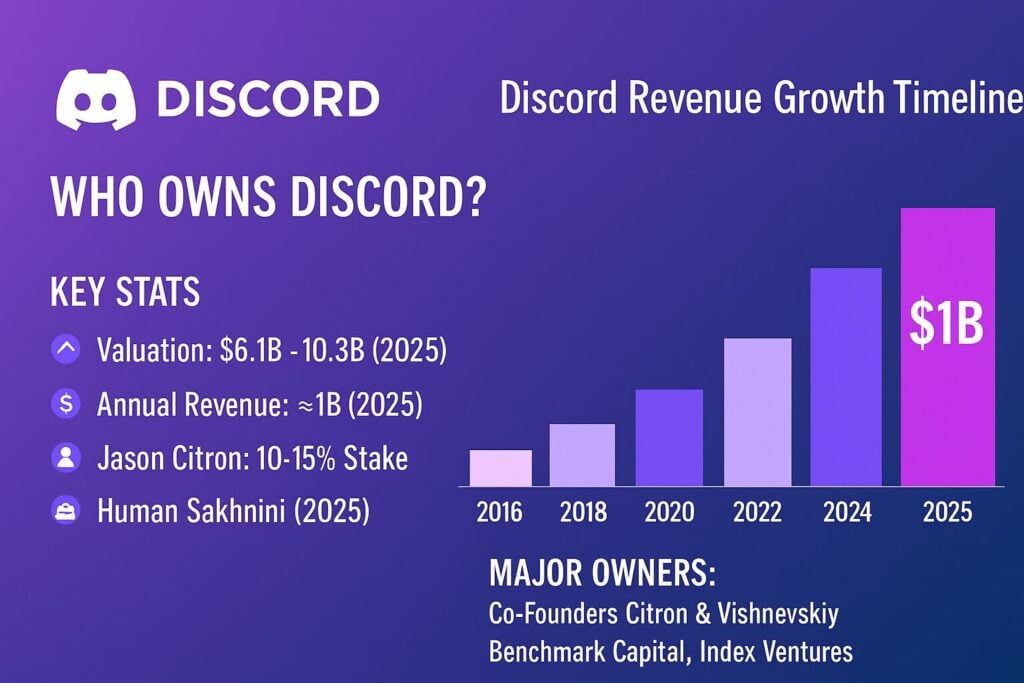Key Stats
- Discord is valued between $6.1 billion and $10.3 billion as of 2025
- Annual revenue reached approximately $1 billion in 2025
- Jason Citron owns an estimated 10-15% stake in Discord
- Humam Sakhnini became CEO on April 28, 2025, replacing co-founder Citron


Discord is primarily owned by its co-founders Jason Citron and Stanislav Vishnevskiy, along with major venture capital firms including Benchmark Capital, Index Ventures, and Greylock Partners. The platform operates as a privately held company with distributed ownership across founders, investors, and employees.
Since its 2015 launch, Discord has evolved from a gaming-focused voice chat application into a comprehensive communication platform serving millions worldwide. The company rejected a $10 billion acquisition offer from Microsoft in 2021, choosing to maintain independence. In April 2025, the platform underwent significant leadership changes when Humam Sakhnini assumed the CEO role from founding member Jason Citron.
Who Owns Discord?
Discord ownership is distributed among multiple stakeholders rather than concentrated in a single entity. The company remains privately held without publicly traded shares available on stock exchanges.
Co-founder Jason Citron retains the largest individual stake at approximately 10-15 percent. His co-creator Stanislav Vishnevskiy holds between 5-10 percent of the company. Together, the founding team maintains significant influence over strategic decisions despite multiple funding rounds that diluted their original ownership percentages.
Venture capital firms control substantial portions of Discord. Benchmark Capital, Index Ventures, and Greylock Partners each hold between 3-10 percent stakes acquired through early-stage investments. Late-stage investors including Dragoneer Investment and IVP possess smaller percentages from growth rounds.
Strategic partners also hold equity positions. Sony Interactive Entertainment invested during 2021 to integrate PlayStation features, acquiring less than 2 percent ownership. Employee stock ownership plans distribute additional shares among Discord’s workforce, aligning team interests with company success.
Largest Shareholders of Discord
Co-Founder Stakes
Jason Citron commands the largest individual ownership position in Discord. His stake likely ranges from 10 to 15 percent following multiple funding rounds that diluted early ownership. Citron previously sold gaming platform OpenFeint for $104 million, bringing entrepreneurial experience to Discord.
Despite stepping down as CEO in April 2025, Citron maintains board membership and advisory responsibilities. His decision to reject Microsoft’s acquisition bid demonstrated commitment to independent growth rather than quick financial exits.
Stanislav Vishnevskiy holds approximately 5-10 percent as Chief Technology Officer. He oversees all technical infrastructure, product design, and engineering operations. While less publicly visible than Citron, Vishnevskiy’s technical leadership proved crucial for scaling Discord’s infrastructure to support millions of concurrent users.
Early-Stage Venture Capital
Benchmark Capital ranks among Discord’s most influential early investors. Partner Mitch Lasky championed the investment during initial funding rounds. Their current stake probably sits in single digits after subsequent dilution, but they retain board representation providing strategic guidance.
Index Ventures led the Series A funding round and returned for Series D. Partner Danny Rimer secured an early board seat, helping expand Discord’s European presence. Current ownership estimates place Index between 5-10 percent, making them one of the largest institutional shareholders.
Greylock Partners entered around Series B, validating Discord’s business model during critical growth phases. Their reputation helped attract engineering talent from Google and other tech giants. Ownership likely falls between 3-5 percent, though their early validation proved invaluable for subsequent funding rounds.
Late-Stage Investment Firms
Dragoneer Investment joined during the Series H round in 2021 when Discord reached a $15 billion valuation. Their stake remains under 2 percent but brought credibility during peak market conditions. Institutional Venture Partners invested during Series C, contributing IPO expertise valuable for potential public market transitions.
Spark Capital holds 2-4 percent acquired through community-focused investment rounds. Fidelity Investments participated in late-stage rounds, adding institutional credibility. These growth-stage investors position Discord for eventual liquidity events while maintaining private status.
Who is on the Board of Directors for Discord?
Founder Representatives
Jason Citron serves as a board member following his transition from CEO. He provides strategic direction rooted in Discord’s original vision. His entrepreneurial background from selling OpenFeint influences long-term planning decisions.
Stanislav Vishnevskiy represents technical leadership on the board. As CTO, he ensures infrastructure decisions align with user growth projections. His board position guarantees engineering considerations influence strategic choices.
Venture Capital Board Members
Danny Rimer from Index Ventures brings extensive software investment experience. He joined the board during Series A funding and guided Discord through multiple scaling challenges. His portfolio includes successful European tech companies, providing international expansion expertise.
David Sze represents Greylock Partners, contributing validation from one of Silicon Valley’s oldest venture firms. His experience with consumer technology investments helps navigate competitive positioning. Sze’s network facilitated key hiring decisions during Discord’s growth phases.
Independent Directors
Stephen Gillett serves as an independent director providing operational expertise. His background includes executive roles at Starbucks and Best Buy, bringing consumer-facing business experience. Independent directors balance investor interests with management execution needs.
The board composition ensures diverse perspectives inform governance. Founder vision combines with investor experience and independent oversight. This structure supports Discord’s private status while maintaining accountability mechanisms similar to public companies.
Board Decision-Making Dynamics
Discord’s board meets quarterly to review financial performance and strategic initiatives. Technology decisions require Vishnevskiy’s technical assessment. Major partnerships need founder approval to ensure alignment with platform values.
The rejection of Microsoft’s acquisition offer demonstrated board independence from short-term financial pressures. Members prioritized long-term community building over immediate liquidity. This approach distinguishes Discord from platforms acquired by larger tech companies like Facebook or Microsoft.
History of Discord Co-founders
Jason Citron’s Entrepreneurial Journey
Jason Citron launched Discord in 2015 after selling his previous gaming venture OpenFeint to GREE for $104 million. That experience taught him about scaling mobile platforms and managing rapid user growth. He identified communication gaps in gaming communities that existing tools failed to address.
Citron initially built Fates Forever, a tablet-based multiplayer game. While developing that game, his team struggled with voice communication tools. Skype felt clunky for gaming coordination. TeamSpeak required complex server setups. This frustration sparked Discord’s creation as internal infrastructure that later became the main product.
As CEO until April 2025, Citron guided Discord through nine major funding rounds. He cultivated relationships with venture capitalists while maintaining founder control. His leadership style emphasized user feedback over aggressive monetization, building loyalty that attracted investors seeking sustainable growth.
Stanislav Vishnevskiy’s Technical Foundation
Stanislav Vishnevskiy brought deep technical expertise from previous engineering ventures. He architected Discord’s voice-over-IP infrastructure enabling low-latency communication. His background in distributed systems proved crucial for handling millions of concurrent users without degradation.
Vishnevskiy designed Discord’s server architecture to scale horizontally across geographic regions. This technical foundation supported rapid user growth without requiring complete infrastructure overhauls. His engineering decisions prioritized reliability over feature additions during early years.
As CTO, Vishnevskiy remains responsible for product development roadmaps and engineering team management. He maintains Discord’s technical culture emphasizing performance optimization. His continued involvement ensures founding principles guide technical evolution as new leadership implements growth strategies.
| Year | Annual Revenue | Platform Valuation |
|---|---|---|
| 2016 | $5M | $100M |
| 2018 | $30M | $500M |
| 2020 | $130M | $3.5B |
| 2022 | $445M | $15B |
| 2024 | $879M | $7.5B-$10B |
| 2025 | $1B | $6.1B-$10.3B |
FAQs
Does Microsoft own Discord?
No, Microsoft does not own Discord. The company offered $10 billion to acquire Discord in 2021, but co-founder Jason Citron rejected the bid to maintain independence.
Is Discord publicly traded?
Discord remains privately held without publicly traded shares. Only institutional investors and employees hold equity stakes through private investment rounds and stock option plans.
Who is the current CEO of Discord?
Humam Sakhnini became Discord CEO on April 28, 2025. He previously served as President of King at Activision Blizzard, bringing gaming industry expertise.
What is Discord’s main revenue source?
Nitro subscriptions provide Discord’s primary revenue. This premium service offers enhanced streaming quality, custom emojis, larger file uploads, and other features generating approximately $1 billion annually.
Does China own any part of Discord?
No Chinese entities currently own Discord stakes. Tencent Holdings previously held 5-7 percent but divested around 2021-2022 due to regulatory concerns.

